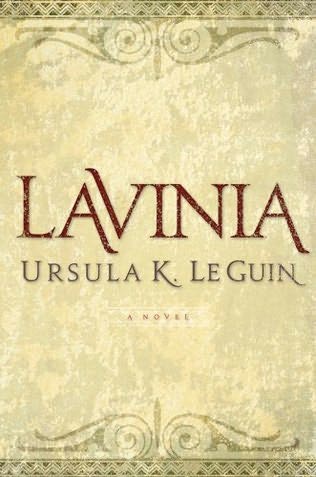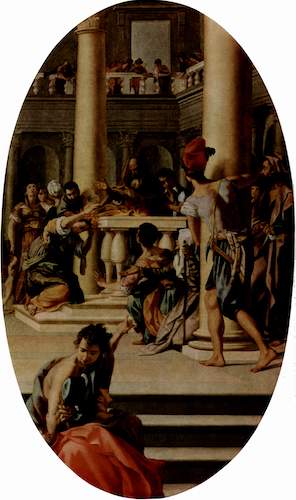
Lavinia by Ursula K. Le Guin
Published: 2008
Awards: Locus Award (2009)
Book Tropes: Roman mythology retelling/ Trojan War
Lavinia was the last bride of the Trojan hero, Aeneas. Aeneas was immortalized in Virgil’s ancient epic (29-19 B.C.), but Lavinia barely got any mention other than as the shy, blushing princess of Latinium. Lavinia is angry with Virgil for that. Virgil and Lavinia end up having a conversation across Time about this oversight.
The end result is that Virgil realizes his poem didn’t do her justice. He focused on women like Camilla and Dido and Creusa, but left out Lavinia! After all, when the Trojans (led by the notorious Paris of Troy) were completely battered by Melenaus’s Spartan army, it was Lavinia who gave them shelter in her homeland.
My thoughts:

The first half of the book is deeply engrossing. Four different (but equally unsatisfactory, as per Lavinia) men from neighboring kingdoms are vying for her hand in marriage — and thus, for control over Latinium itself.
Lavinia’s father goes to the Oracle for advice. The Oracle prophecies that flame-haired Lavinia will bring war to her people, but her descendants will be a far greater race, if she marries Aeneas. Lavinia agrees, but somehow the wedding ends up in a war between the Trojans and the other Latinium kingdoms. Thousands of people are killed, raped, orphaned, land laid waste— and Lavinia weeps at it all.
Here, I lost sympathy for Lavinia’s characterization. She wanted the glory of being the grand ancestor of many heroes and a whole city named after her. She knew the costs too. The option of not marrying at all had also been available to her. Yet she chose to marry Aeneas with eyes open wide, so why weep now? Possibly I am being too harsh here. But there was a lot of self-righteous I-me-myself going on in Lavinia’s version of events, which was unpalatable at times.
Why you should read this book:
The highlights of the book were the curious pieces of research from Le Guin, that mammoth name in SFF literature. Yes, it’s not supposed to be a historical treatise, but some bits were so interesting! For example:
Did you know that the war started because Aeneas’s son from his first wife killed the beloved deer of a shepherd in Latinium? Did you know that Rome got its name from one of the sacred names of River Tiber, the “Rumon”? Or did you know that Albunea was the cave where the sacred She-Wolf nursed the twins Remus and Romulus (the founders of Rome)?
The language is in first person narrative, so beautifully phrased that you are fooled into thinking Lavinia is some great heroine. But was she? She seems to have been the means by which Trojans come to a land that would later become Rome. But outside of the marriage, she never really had a voice. Lavinia’s hands are ultimately tied-down in a way that makes her a mere vehicle or a pawn in the great game of history. Let’s part with a metaphor from Le Guin:
I said at last, ‘Have you seen, when the young men have archery contests, sometimes they catch a dove, and put a cord round her foot, and shinny up a high pole and tie her to the top, leaving just enough cord so she thinks she can fly? And then she is the target of their arrows.’
‘I have seen that.’
‘If I were an archer, I’d break the cord with my arrow.’
12 replies on “Lavinia by Ursula K. Le Guin”
Oh that quote at the end – chills. I’ve not read Ursula Le Guin and really need to!
Lavinia would be a good starting point for Le Guin’s work — more accessible perhaps. But not sure if you’ll like it much…
This has been on my wishlist/TBR for a long time and I really need to get around to it already. Your review only convinced me more!
It has a very YA style, so that makes the book easier to read. And knowing your love for all things Graeco-Roman mythology, I think you might like this.
That’s a really good quote to end with! I don’t honestly remember Lavinia from any of the stories, so I can see why she would be upset at the poets. 🙂 This sounds like a neat way to approach her story.
Yes! There’s a definite trend to re-interpreting history, including the wonderful book Circe. 🙂
Interesting premise. I read the Aeneid several years ago, and don’t remember anything about Lavinia. No wonder she had a grievance with Virgil. ;D
Haha. Very true. I haven’t read Aeneid, but even though I don’t like Lavinia much, I can see why she would be miffed about it.
Hmm… now this is interesting. I’ve only read a little Le Guin and didn’t even really know about this one, honestly. And I love the sound of the conversation over time! Nor did I know that she touched on history/ myth like this…
Lavinia is my only Le Guin read till date. The time travel was a bit of a surprise, their “spirits” kinda meet across time in these sacred “caves of Albunea”. It was an odd book overall… I’m still not sure if I liked the book, but it definitely raised some interesting facets about that historical period.
Oh wow, that quote at the end really hit a nerve.
Sounds like an interesting read Lex! Bit heavy, but still worth it.
Fun fact – we grew up with an Afrikaans story about a friendly little witch whose name was Lavinia!
Now, that’s a Lavinia I can grow to like! 🙂